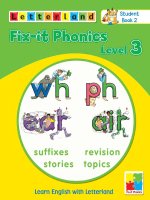Impact 3 grammar book
Bạn đang xem bản rút gọn của tài liệu. Xem và tải ngay bản đầy đủ của tài liệu tại đây (1 MB, 56 trang )
impact
3
Grammar Book
NATIONAL
GEOGRAPHIC
LEARNING
impact
3
Grammar Book
Unit 1 Who Am |? 4
Question tags 6
Special uses of it 8
Unit 2 Misunderstood Animals 10
Modals 12
Infinitives with and without to 14
Unit 3 Everybody's Doing It! 16
Separable and inseparable
two-word verbs 18
Enough, too many, too much 20
Unit 4 Fashion Footprints 22.
Present passive 24
Modals 26
Unit 5 Flying High 28
Past perfect 30
Past perfect continuous S2
Unit 6 New Frontiers 34
Present and past conditionals 36
Adverbs 38
Unit 7 Visual Stories 40
Past passive 42
Reported speech 44
Unit 8 Perform and Create 46
Gerunds and infinitives 48
Sense verbs + infinitive 50
Grammar boxes 52
Irregular verbs 54
Unit1 Who Am I?
Question tags
Special uses of if
Friends celebrating Holi, the Indian festival of colours
Question tags: Confirming information
or seeking agreement
Question tags are short questions at the end of statements. We use question tags: is nervous.)
sure that the person
® to confirm our opinion, or an idea.
Alicia is friendly, isn’t she? (We are not sure if Alicia is friendly.)
© when we are seeking agreement.
You're nervous about the competition, aren't you? (We are fairly
We make question tags with an auxiliary verb + a pronoun.
David likes tennis, doesn’t he?
When the sentence is positive, we use a negative question tag.
Lin also plays the flute, doesn’t she?
When the sentence is negative, we use a positive question tag.
Rick doesn't live near here, does he?
The question tag for / am is aren’t I?
REMEMBER
We use our tone of voice to show if we are confirming our opinion or seeking agreement.
If the voice goes up at the end of the question, it is a genuine question, because we are not sure
of the answer.
one
You're not hungry, are you?
If the voice goes down at the end of the question, we are asking the person to agree with us because
we are fairly sure of the answer already.
i
You're hungry, aren’t you?
We often use a negative sentence + a positive question tag to ask for things or information, or to ask
someone to do something. The voice goes up in these questions.
You couldn’t make me a sandwich, could you?
@ Complete the sentences with is, isn’t, are or aren’t.
Example: You are a chef, aren’t you?
1. She isn’t very well, ——————— she? 5. You_______ paying attention, aren’t you?
2. | am so funny, I2 6. They are a great band, _ they?
3.We_ — — — g0ingto miss the bus, arentwe? 7. It's a cold day, ——————— it?
4.He_——jo— king,isnthe? 8. You are studying English, —————— you?
6 UNIT1
© Match the two parts to make questions. a. won't you?
1. They didn't come to the party, b. isn’t she?
2. She didn’t receive my tn. c. did they?
d. can’t I?
3. You will tell me about your trip, e. did she?
4. | can phone her to apologise,
5. He won't leave without me, f. will he?
6. She is very competitive,
6 Complete the questions.S oO mee o TÔ TẾ
Example: I’m not annoying you, am |?
_____ — —_ listeningto me, was he?
going to be in trouble, aren’t they?
finish the project by Monday, won”t you?
afford a new car, can we?
like classical music, does he?
——— —— — C00ked this dish very well, have they?
starting to learn new techniques, isn't he?
————————— ÿ00ut†Very often, do they?
6 Use the prompts to write question tags. Then write answers.
Example: you / be/ very bossy No, I’m not!
You're very bossy, aren’t you?
1. your friend / sometimes ignore / you
2. your dad/ make / the best fish pie
3. Mr Lee/ not like/ Chinese food
4. your classmates/ be / very competitive
5. you/ live/ near the sea
UNIT1 7









